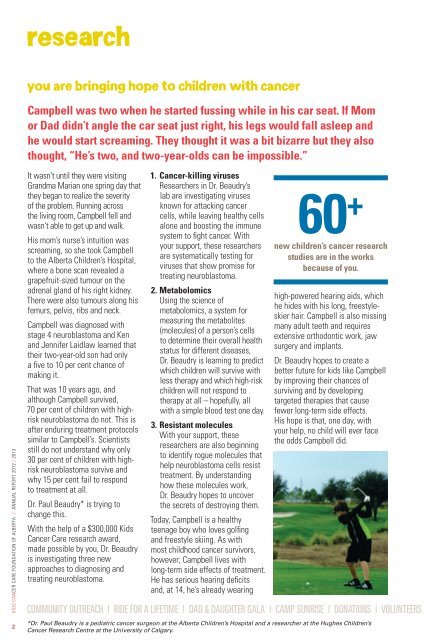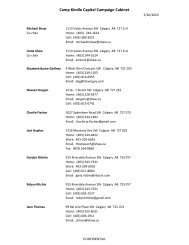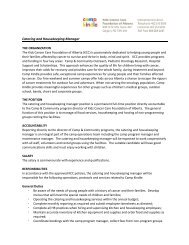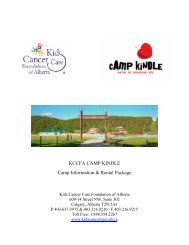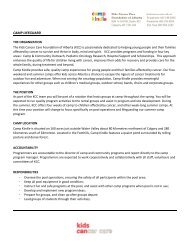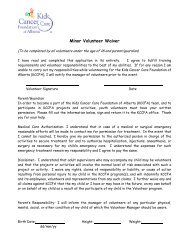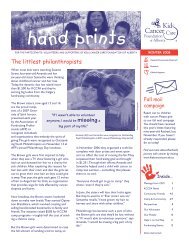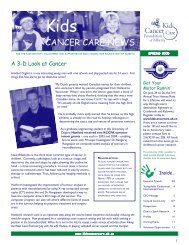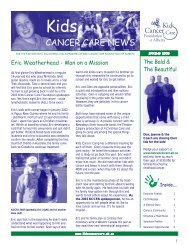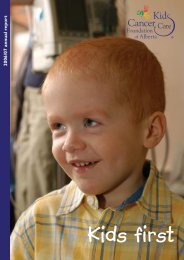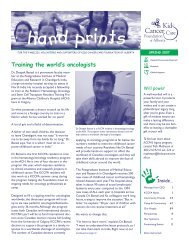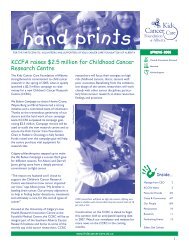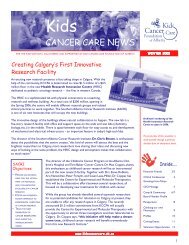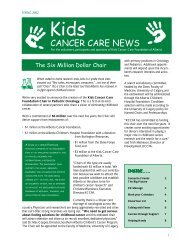2012/2013 KCC Annual report - Kids Cancer Care
2012/2013 KCC Annual report - Kids Cancer Care
2012/2013 KCC Annual report - Kids Cancer Care
Create successful ePaper yourself
Turn your PDF publications into a flip-book with our unique Google optimized e-Paper software.
esearch<br />
you are bringing hope to children with cancer<br />
Campbell was two when he started fussing while in his car seat. If Mom<br />
or Dad didn’t angle the car seat just right, his legs would fall asleep and<br />
he would start screaming. They thought it was a bit bizarre but they also<br />
thought, “He’s two, and two-year-olds can be impossible.”<br />
KIDS CANCER CARE FOUNDATION OF ALBERTA / ANNUAL REPORT <strong>2012</strong> / <strong>2013</strong><br />
2<br />
It wasn’t until they were visiting<br />
Grandma Marian one spring day that<br />
they began to realize the severity<br />
of the problem. Running across<br />
the living room, Campbell fell and<br />
wasn’t able to get up and walk.<br />
His mom’s nurse’s intuition was<br />
screaming, so she took Campbell<br />
to the Alberta Children’s Hospital,<br />
where a bone scan revealed a<br />
grapefruit-sized tumour on the<br />
adrenal gland of his right kidney.<br />
There were also tumours along his<br />
femurs, pelvis, ribs and neck.<br />
Campbell was diagnosed with<br />
stage 4 neuroblastoma and Ken<br />
and Jennifer Laidlaw learned that<br />
their two-year-old son had only<br />
a five to 10 per cent chance of<br />
making it.<br />
That was 10 years ago, and<br />
although Campbell survived,<br />
70 per cent of children with highrisk<br />
neuroblastoma do not. This is<br />
after enduring treatment protocols<br />
similar to Campbell’s. Scientists<br />
still do not understand why only<br />
30 per cent of children with highrisk<br />
neuroblastoma survive and<br />
why 15 per cent fail to respond<br />
to treatment at all.<br />
Dr. Paul Beaudry* is trying to<br />
change this.<br />
With the help of a $300,000 <strong>Kids</strong><br />
<strong>Cancer</strong> <strong>Care</strong> research award,<br />
made possible by you, Dr. Beaudry<br />
is investigating three new<br />
approaches to diagnosing and<br />
treating neuroblastoma.<br />
1. <strong>Cancer</strong>-killing viruses<br />
Researchers in Dr. Beaudry’s<br />
lab are investigating viruses<br />
known for attacking cancer<br />
cells, while leaving healthy cells<br />
alone and boosting the immune<br />
system to fight cancer. With<br />
your support, these researchers<br />
are systematically testing for<br />
viruses that show promise for<br />
treating neuroblastoma.<br />
2. Metabolomics<br />
Using the science of<br />
metabolomics, a system for<br />
measuring the metabolites<br />
(molecules) of a person’s cells<br />
to determine their overall health<br />
status for different diseases,<br />
Dr. Beaudry is learning to predict<br />
which children will survive with<br />
less therapy and which high-risk<br />
children will not respond to<br />
therapy at all – hopefully, all<br />
with a simple blood test one day.<br />
3. Resistant molecules<br />
With your support, these<br />
researchers are also beginning<br />
to identify rogue molecules that<br />
help neuroblastoma cells resist<br />
treatment. By understanding<br />
how these molecules work,<br />
Dr. Beaudry hopes to uncover<br />
the secrets of destroying them.<br />
Today, Campbell is a healthy<br />
teenage boy who loves golfing<br />
and freestyle skiing. As with<br />
most childhood cancer survivors,<br />
however; Campbell lives with<br />
long-term side effects of treatment.<br />
He has serious hearing deficits<br />
and, at 14, he’s already wearing<br />
60 +<br />
new children’s cancer research<br />
studies are in the works<br />
because of you.<br />
high-powered hearing aids, which<br />
he hides with his long, freestyleskier<br />
hair. Campbell is also missing<br />
many adult teeth and requires<br />
extensive orthodontic work, jaw<br />
surgery and implants.<br />
Dr. Beaudry hopes to create a<br />
better future for kids like Campbell<br />
by improving their chances of<br />
surviving and by developing<br />
targeted therapies that cause<br />
fewer long-term side effects.<br />
His hope is that, one day, with<br />
your help, no child will ever face<br />
the odds Campbell did.<br />
COMMUNITY OUTREACH | RIDE FOR A LIFETIME | DAD & DAUGHTER GALA | CAMP SUNRISE | DONATIONS | VOLUNTEERS<br />
*Dr. Paul Beaudry is a pediatric cancer surgeon at the Alberta Children’s Hospital and a researcher at the Hughes Children’s<br />
<strong>Cancer</strong> Research Centre at the University of Calgary.


